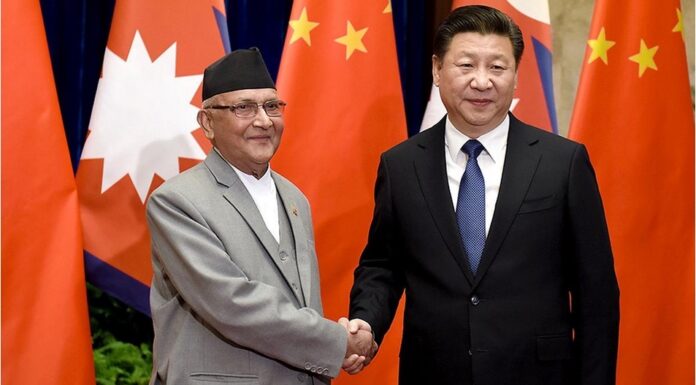By P.K.Balachandran
Colombo, December 7: Not getting an invitation from New Delhi to visit to India after he took over as Nepal’s Prime Minister in July this year, K.P.Sharma Oli broke a long standing tradition of Nepalese Prime Ministers visiting India first before paying an official visit to any other country.
This month, Oli did what New Delhi considers extremely inappropriate, namely, visiting China first. He was in China from December 2 to 6, meeting President Xi Jinping and signing many agreements.
However, Oli is not to be entirely faulted. He had waited for four long months for an Indian invitation. But having got no invite, he took the drastic step of going to Beijing first.
The Hindu reported that relations between India and Nepal are strained over some issues. India had refused to give overflight rights vis-à-vis certain areas citing security considerations. It had objected to Chinese investments in Nepal and refused to use Chinese components in India-Nepal joint project work.
K.P. Sharma Oli, a communist, became Prime Minister for the fourth time in July 2024 after the government led by Maoist leader Pushpa Kamal Dahal, collapsed. It had lost a Motion of No Confidence in the Nepalese parliament. Dahal lost because coalition partner Oli withdraw support to him.
Though both Oli and Dahal were communists, and both were pro-China too, they differed on many key issues. To bring the Dahal-led government down, Oli joined hands with the pro-India Nepali Congress.
But New Delhi was not pleased with the Oli-Deuba coalition because Oli, and not Deuba, became PM. As PM, Deuba would have been more amenable to New Delhi.
Chinese Projects
In August, Nepal had made a formal request to China to waive the loan for the Pokhara International Airport project and convert it into a grant. But China had been non-responsive. China is reluctant to offer grants.
The Nepali Congress, and Oli’s own Communist Party of Nepal (Unified Marxist Leninist), have sought grants from China and not loans for Nepal’s projects. After Sri Lanka was driven to bankruptcy by debts in 2022, a fear of debt traps has seized Nepalese.
On December 6, Oli returned to Nepal after having signed several agreements with China. Among them were: an MoU for the construction of the Tokha-Chahare tunnel road and another road to enhance Nepal-China trade. But according to Reuters, the nine deals that Nepal signed with China in Beijing were not new. They were a rehash.
However, at his meeting with Oli, Xi Jinping reiterated China’s offer to transform Nepal from a “land-locked” country into a “land-linked” one. According to Nepal watchers, Xi did this to tell India that it should not close the entry and exit points on the Indo-Nepalese border to prevent goods and services from reaching Nepal and bring Nepal to its knees.
After India imposed a six-month oil blockade on Nepal in 2015, Oli, who was PM then, sought an opening to China. In the same year, China gave US$ 500 million after an earthquake wiped out a third of the country’s GDP was wiped out.
China and Nepal signed the Trade and Transit Agreement (TTA) in 2016. China gave access of seven of its sea and land ports to Nepal, which included four seaports (Tianjin, Shenzhen, Lianyungang and Zhanjiang) and three land ports (Lanzhou, Lhasa and Xigatse).
China is building the Kyirong Kathmandu railroad through one of its BRI projects worth US$ 2.15 billion.
However, according to Harsh Pandey of the New Delhi-based Observer Research Foundation the Trade and Transit Agreement (TTA) provisions have proved to be disadvantageous for Nepal. According to Ministry of Industry, Commerce and Supplies officials, not a single shipment has moved between China and Nepal after seven years of signing the agreement.
Nepal’s freight service providers are uncomfortable doing business via China because of abrupt stoppages and closing of borders. The Kathmandu Post reported that some Nepali traders accused China of deliberately stopping them and creating an “undeclared trade blockade”
END



 Logging you in...
Logging you in... Loading IntenseDebate Comments...
Loading IntenseDebate Comments...

